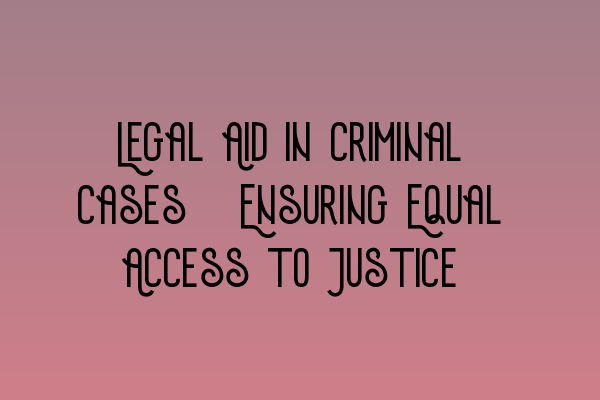Legal Aid in Criminal Cases: Ensuring Equal Access to Justice
Ensuring equal access to justice is a fundamental principle of any well-functioning legal system. In criminal cases, where an individual’s freedom is at stake, it becomes even more crucial to provide adequate legal representation to all, regardless of their financial status. This is where legal aid plays a significant role.
Legal aid is a system that allows individuals who cannot afford to hire a private solicitor to receive free or subsidized legal assistance. In the UK, legal aid in criminal cases is governed by the Legal Aid, Sentencing and Punishment of Offenders Act 2012. The goal is to ensure that everyone, regardless of their economic background, has access to legal representation.
However, accessing legal aid in criminal cases is not always straightforward. There are eligibility criteria that individuals must meet to qualify for legal aid. These criteria include factors such as the seriousness of the allegation, the individual’s financial circumstances, and the merits of the case. To determine eligibility, individuals are required to undergo a financial means test.
While the intention behind these criteria is to allocate resources properly, there have been concerns raised about the effectiveness of the current legal aid system. Some argue that the eligibility criteria are too strict, leaving many individuals without access to legal representation. Others claim that the rates paid to solicitors for legal aid work are insufficient, resulting in a lack of skilled professionals willing to take on such cases.
Improving access to legal aid in criminal cases requires a comprehensive approach. First and foremost, the eligibility criteria should be reviewed to ensure that they are fair and do not exclude those who genuinely require assistance. Additionally, the rates paid to solicitors for legal aid work should be increased to attract and retain experienced practitioners.
Furthermore, raising awareness about the availability of legal aid is crucial. Many individuals facing criminal charges may not be aware that they are eligible for assistance. Efforts should be made to educate the public and provide information about the legal aid application process.
At SQE Criminal Law & Practice Law UK, we understand the importance of equal access to justice. We offer comprehensive SQE 2 Preparation Courses to aspiring solicitors, ensuring they are well-equipped to handle criminal cases. Our SQE 1 Preparation Courses cover all the necessary knowledge and skills required to pass the SQE 1 exam, including topics related to legal aid and criminal law. We also provide up-to-date information on SRA SQE Exam Dates to help you plan your study schedule effectively.
In conclusion, legal aid in criminal cases is essential for ensuring equal access to justice. It is crucial to review and improve the current system to remove any barriers that prevent individuals from receiving the legal representation they deserve. By working towards a more inclusive legal aid system, we can uphold the principles of justice and fairness for all.
